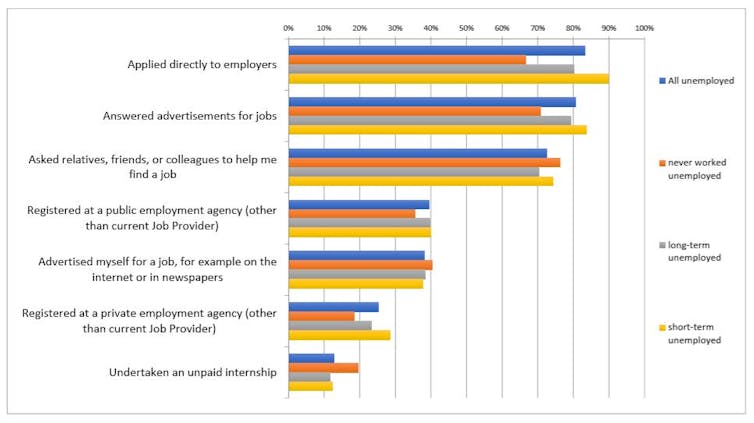These 'job snob' claims don't match the evidence
- Written by Michelle Peterie, Research Fellow, The University of Queensland
The “job snobs” are back on the agenda.
With some in the Australian government’s own ranks arguing for a lift in the unemployment benefit, senior ministers appear to be upping the rhetoric about joblessness being a matter of choice for many.
“There are jobs out there for those who want them,” the federal minister for employment, Michaelia Cash, has told The Australian.
Yesterday the Murdoch-owned newspaper published her comments in a front-page story that suggested Department of Employment research showed almost half of all employers were finding it difficult to hire workers due to “lack of interest” – or because applicants did not have adequate qualifications.
The article was vague on which issue was the bigger problem, but it led with the claim “job seekers are actively snubbing work opportunities”.
Such rhetoric is not new. Since the 1980s, governments have increasingly stressed “the best form of welfare is a job”.
Requirements that claimants show they are actively looking for work have become more onerous. Yet talk about job snobs and dole bludgers continues.
Former federal Liberal Party senator Bronwyn Bishop talks about dole bludgers.The research, however, suggests these perceptions are largely a myth.
Between 2015 and 2018, we were part of a team studying the well-being, social networks and job search experiences of unemployed Australians.
Our study, funded by the Australian Research Council, involved policy analysis, surveys and in-depth interviews. We talked to employment service providers and 80 job seekers in regional and urban areas of New South Wales and Queensland.
We found no evidence job-seekers preferred not to work. In fact, based on the considerable “job search activity” required of them to meet Centrelink’s stringent “mutual obligation” conditions, it was hard not to conclude that, whatever the reasons for their joblessness, lack of willingness to work was not one of them.
 This chart shows the results of our survey of 759 unemployed Australians about what attempts they had taken to get a job.
The authors, Author provided (No reuse)
This chart shows the results of our survey of 759 unemployed Australians about what attempts they had taken to get a job.
The authors, Author provided (No reuse)
Entry-level jobs
While Australia’s official unemployment rate is 5.2% – a relatively low figure historically – structural labour market issues create serious hurdles for some.
One is for older people. Another is for people without experience. A 2017 study by Anglicare, for example, found the proportion of entry-level vacancies slipped from 22% to 15% over a decade. This means just one entry-level job for about every five entry-level job seekers.
Read more: Young people still find it hard to get a job, despite using the same tactics as older job seekers
This helps explain why employers quoted in The Australian’s story spoke more about “lack of job-readiness” being a problem, rather than lack of interest.
For the manager of an inner-Sydney restaurant “sifting through stacks of resumes”, the problem might have something to do with those on Newstart having to apply for so many jobs.
Moving to where the jobs are
One trope used to suggest there are “job snobs” is to invoke job vacancies in regional and rural areas.
Last year the federal government declared job-seekers would have their unemployment payments reduced or withdrawn if they refused work on farms. Those on taxpayer support, said the prime minister, Scott Morrison, had “no excuse to refuse opportunities”.
Packing up and moving for work, however, isn’t necessarily that simple.
The vast majority of job-seekers in our study expressed a strong general willingness to move for work, and many had relocated in the past.
But whether they would move for a particular opportunity depended on the sorts of factors the rest of us would consider.
They were cautious about moving for short-term, temporary roles given the the cost of moving, for example. Hitting “the Harvest Trail” was seen as an expensive and risky proposition. Some individuals had no spare cash to move even if they wanted to.
Read more: Are most people on the Newstart unemployment benefit for a short or long time?
Also important were family considerations – such as maintaining stability for children in school, or caring for ageing parents.
Some feared they would not be able to find rental accommodation as affordable as what they had. Many younger people still living with their parents were wary of moving away from family support, particularly if they didn’t own a car.
Many of our interviewees also expressed feelings of depression, perhaps reflecting underlying economic insecurity and uncertainty. Long-term unemployment and poverty are associated with poor mental health, which could affect someone’s willingness to leave support networks of family and friends.
Shifting responsibility
Our research on the complex reasons that might prevent job-seekers from seizing every job opportunity points to the dangers of making punitive generalisations such as “there are jobs out there for those who want them”.
Such rhetoric glosses over the lived realities of being unemployed. It ignores the conditions of individuals’ lives. It obscures the structural realities of competitive labour markets. It shifts responsibility for unemployment to the individual.
A richer understanding of the realities of unemployment and poverty, as well as a broader conception of well-being, is needed to solve the problem.
Authors: Michelle Peterie, Research Fellow, The University of Queensland
Read more http://theconversation.com/these-job-snob-claims-dont-match-the-evidence-121429



















